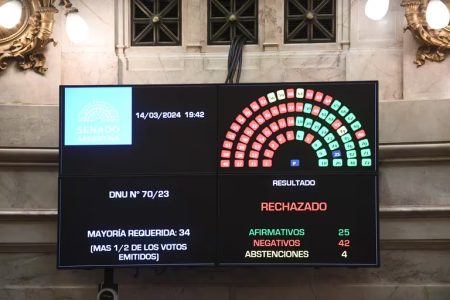All the Answers
Well-known member
The new setback in Congress tests the market's confidence in the progress of the Milei plan - Infobae

Source:

El nuevo revés en el Congreso pone a prueba la confianza del mercado en los avances del plan de Milei
El nivel de apoyo político es la principal obsesión de los inversores. Bonos y acciones se anticiparon con caídas al resultado de la sesión en el Senado. El dólar, con dinámica propia
March 15, 2024
By Virginia Porcella

FILE PHOTO: Argentina's president Javier Milei addresses the Conservative Political Action Conference (CPAC) annual meeting in National Harbor, Maryland, U.S., February 24, 2024. REUTERS/Elizabeth Frantz/File Photo
While the dynamics of the dollar remain independent of any factor that exceeds purely financial variables, the rest of the assets are much more sensitive to other stimuli. The main one, the advance (or setback) of Javier Milei's economic reforms in the context of a political negotiation that is beginning to get stuck again.
In the hours before the Senate rejected DNI 70/2023, stocks and sovereign bonds seemed to discount the result of the session. Shares fell 1.8% locally in dollars and those listed on Wall Street also closed mostly lower. The same thing happened with debt securities in dollars: they all closed lower. The one that suffered the most was the AL35. This negative performance in the previous one could mitigate the effect starting today, which will ultimately depend largely on the official reaction to the new setback in Congress.
That is, strictly speaking, the “variable” that obsesses investors, particularly abroad: what level of support the libertarian administration will get to keep the adjustment underway and impose the promised reforms. In this context, the call for the May Pact made the markets completely forget the official setback of the Bases Law and, on the back of the good fiscal results, the accumulation of reserves and the slowdown in inflation, they renewed their confidence in Milei's plan. But the senators' vote last night turns the yellow lights back on.
“Negotiating with the governors weakens you, because you need deputies more than ever and once again exposes legislative and armed weakness,” considered economist Gabriel Caamaño, in line with some operators who do not notice extreme tension in the market from today but a moderation of enthusiasm.

The senators' rejection of the DNU casts a pall of doubt on the rest of the reforms. Photos: Gabriel Cano / Senate Communication.
“They ask more about governability than about when the restrictions will be lifted,” an executive from a bank that has been receiving different investment funds for weeks told Infobae that they get to know on the ground the implementation of the measures adopted by Milei and his minister. of Economy, Luis Caputo. Until yesterday, those financial tourists took the return flight with high doses of optimism. Yesterday, the Senate cast a pall of doubt on that positive outlook.
Because, even if Milei manages to maintain high levels of adhesion even in the midst of the toughest stage of adjustment, politics seems to continue to be a pending issue. The market has not yet seen any progress on any of the measures in Congress. And the rejection of the DNU in the Senate dents the positive expectations that existed until now regarding the negotiation with the governors for the Base Law, prior to the signing of the May Pact. That negotiation was well received by investors abroad.
A recent mission from Bank of America , for example, told its clients of the optimism, although moderate, regarding “the possibilities of an agreement between the Government and the governors to approve a package of laws that includes fundamental economic measures. The laws could include a change in the pension formula, a fiscal pact to increase income and a regime to promote large-scale projects in the hydrocarbon and energy sectors.” The North American bank considered that both parties have incentives to reach an agreement, since the province's income is falling by around 25% year-on-year and the Government needs to consolidate the fiscal adjustment. He also highlighted that even part of the labor reform has political support. However, he warned: “ Uncertainty remains . ”

